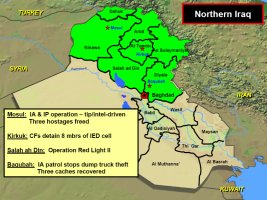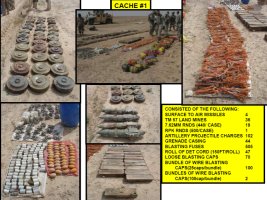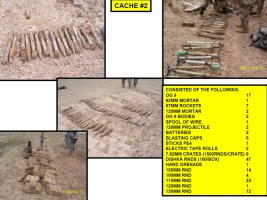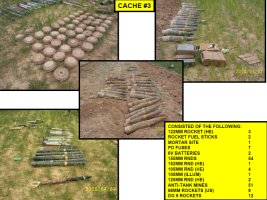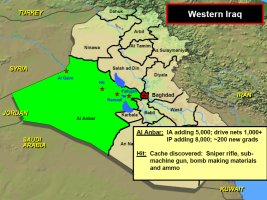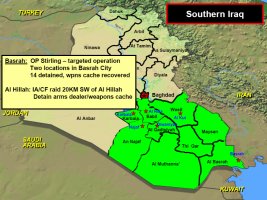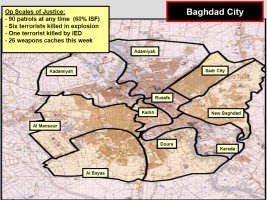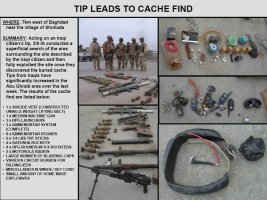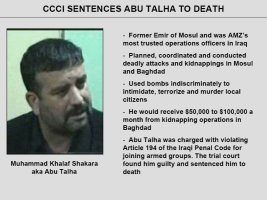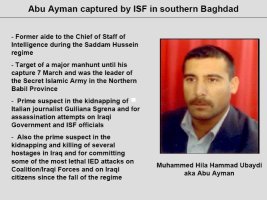
Weekly Press Briefing April 6, 2006
Multi-National Force-Iraq
IRAQ OPERATIONAL UPDATE BRIEFING BRIEFER: MAJOR GENERAL RICK LYNCH, SPOKESMAN, MULTINATIONAL FORCE IRAQ LOCATION: COMBINED PRESS INFORMATION CENTER, BAGHDAD, IRAQ TIME: 8:00 A.M. EDT DATE: THURSDAY, APRIL 6, 2006
GEN. LYNCH: Again, thanks for taking the time. I know how busy you are. I appreciate you taking the time to let me talk you through the operations that we're conducting here in Iraq over the course of the last week.
But before I do that I think it's appropriate to step back for a minute and think about the past three years. About three years ago, then V Corps Commander, Lieutenant General Scott Wallace, and the 3rd Infantry Division Commander, Major General Buff Blount, decided it would be appropriate to send a brigade, an entire brigade combat team, into Baghdad, into the heart of Saddam's regime. So they launched the 2nd Brigade 3rd Infantry Division, Colonel David Perkins' brigade, the Spartans, and they did a thunder run that ended up in downtown Baghdad, starting on the 7th of April.
Fighting continued, but the people of Iraq and the people of the world knew the coalition was there to free the people of Iraq and to break the heart of the Saddam regime. And that indeed happened. And on the 9th April, as all of you saw and the world saw, the statue of Saddam Hussein in Firdos Square was toppled.
Let's think about what happened over those last few years. It's an amazing thing to me. Sometimes we get so caught up in the event of the day, the struggle with forming the national unity government, the most recent IED or VBIED, we forget that progress has been made over the last three years. And in those three years, the people of Iraq toppled a dictator, and that same dictator now is being tried in an Iraqi court, by the Iraqi people, for crimes he committed against the Iraqi people. They drafted, ratified a constitution, had a constitutionally based election in December of which 75 percent of the eligible electoral populace took place -- over 10 million voters. They've elected this government, the Council of Representatives has formed, and now they're working to form the national unity government. That is an amazing progress in a three-year period of time, and it will be celebrated by the Iraqis on the 9th of April. The Iraqi government has declared 9 April as Iraqi Freedom Day.
First graphic, please. I want to talk about things we're doing to the enemy. I want to talk about our operations against them. Just to kind of set the stage, since October -- correction, just in the last five months we have conducted over 8,200 company-level and above operations against the insurgents -- 8,200. That average out to about 65 operations per day over that five-month period. Of note, 30 percent of those operations were Iraqi security force independent operations: they planned them, they led them, and they executed them. Today across Iraq, over a quarter million members of the Iraqi security forces, trained and equipped. Remember, the end state is 325,000 by December -- so 75 percent of the Iraqi security force is trained and equipped on the streets in the fight today -- over a quarter million. Amazing.
Let me walk you around Iraq and talk about specific operations. First let me focus up in the north. And throughout this you'll see the theme of how the Iraqi army and the Iraqi police tend to be in the lead. In an operation last week up in Mosul, a local citizen told members of the Iraqi army that there are three people that have been kidnapped, being held in a specific house in Mosul. The Iraqi army coordinated with the Iraqi police, and they conducted a combined operation. Remember, this is a tip from a local citizen. They went to the house. Nobody home. The citizen said, Hey, this house has a basement -- look in the basement. And in the basement they found three hostages in three separate cells chained to the wall. The Iraqi army, the Iraqi police cooperated in the operation and freed those three hostages.
We're on the lookout across Iraq with the coalition forces and the Iraqi security forces on IED emplacement. We're at the point now where we are finding and clearing almost half the IED that are emplaced by the insurgents. Part of that is because we're watching for it and use all the techniques that we have and all the capabilities we have. So in Kirkuk last week we saw an IED being emplaced, we conducted an operation, killed two of the insurgents that were emplacing the IED and detained eight others. And you've seen just recently video, Predator video of a similar operation around Balad, where one our unmanned aerial vehicle, a Predator, was able to watch three individuals clearly emplacing IED, and those three individuals were killed in the course of that activity.
In Salah Ad Din, operation Red Light II, again Iraqi led. Actionable intelligence about an insurgent cell that was planning to conduct operations. We raided that cell. They detained 17 individuals. Importantly they found four weapons caches, and let me show you the details of the cache. First side, please. I'd ask you to spend just a minute and look at the type and quality of munitions that were found by this raid, by Operation Red Light -- four surface- to-air missiles, over 102 artillery projectile charges, over 500 blasting fuses, and bundles of wire blasting caps, over 100 -- clearly intended for the fabrication and emplacement of IEDs.
Next graphic, please. Again, same operation. That weapons cache was found. And the third slide, please. Third picture, please. So I'd ask you to study that and see we are having an effect against the enemy and its ability to emplace IEDs and VBIEDs. We're taking away the bomb makers, we're taking away the munitions, we're taking away the cells that are planing to conduct these activities. And Operation Red Light is an example of that that we did last week in Salah Ad Din in an Iraqi-led operation.
Let's zoom in on Baqubah, and Iraqi army operation. They saw an insurgent cell trying to steal a dump truck. They moved to stop the operation. In the conduct of the operation, an Iraqi army sergeant major was killed. Four insurgents were also killed. As they got to the site and they worked their way around the site, they found a car that these insurgents had been in. In the car was a mortar, base plate, mortar rounds. And around as they searched the area they found three additional weapons caches, to include an anti-aircraft machine gun and surface-to-air missiles. So great operations up in the north continue against the insurgents.
Last week we had 27 attacks against coalition forces and Iraqi security forces or innocent Iraqi civilians in the north, of which only 8 were effective.
Next chart, please. Let's look out west. Everybody thinks about out west being the problem. I told you before the majority of attacks in Iraq take place in three provinces: Baghdad, Al Anbar and Salah Ad Din. So there's still significant enemy activity in Al Anbar, but last fall in Al Anbar we were averaging 29 attacks a day. Now we're averaging 19. Yesterday there were 17 attacks against Iraqi civilians, Iraqi security force and coalition forces, and of those 17 attacks only two were effective that resulted in a casualty. A lot of operations to talk about out west. We've had significant effect against terrorists and foreign fighters trying to infiltrate into Baghdad through the Euphrates River Valley. Last July in Iraq we were averaging 5 suicide attacks per month.
Now the first three months of this year we're averaging 24 suicide attacks per month, less than half, because of the effectiveness we've had against the operations in Al Anbar and blocking the flow of foreign fighters through the Euphrates River Valley.
There's two divisions out there, Iraqi army divisions: the 7th Division and the 1st Iraqi Army Division. The 7th Division did a major operation and hit, discovered weapons caches, significant weapons caches. And this morning the 1st Iraqi Army Division, a battalion from that division, and one of the coalition battalions, started an operation in Ramadi. We talk routinely with the national leadership and provincial leadership, specifically Al Anbar. And the provincial leadership said we need to get the sons of Al Anbar as part of the Iraqi security forces. We've got a shortfall in Al Anbar. We need 5,000 additional members of the army, and we need 8,000 additional members of the Iraqi police in Al Anbar -- a massive recruiting drive going on now sponsored by the Ministry of Defense and the Ministry of Interior. But let me give you an example. A mobile recruiting team from the Ministry of Defense, along with coalition recruiters, started in al Qaim and worked its way down the Euphrates River Valley on a recruiting campaign. They were successful and were able to recruit 1,000-plus members for the Iraqi Army. These were sons of Al Anbar that will be trained in Al Anbar, will go to specialty training and join members of the Iraqi Army.
In addition, the Iraqi police just recently -- 200 members, citizens of Ramadi who had enlisted in the Iraqi police, graduated from Baghdad Police Academy on the 23rd of March. On the 23rd of March they were taken back to Ramadi. There at the Ramadi Glass Factory they were met by coalition forces, Iraqi armed forces and people of Ramadi. They were welcomed as returning heroes back to Ramadi, and now those 200 individuals are patrolling the streets of Ramadi as Iraqi policemen.
We've said all along significant shortfall in police in Al Anbar. The intent is to have 11,330 police by the end of the year in Al Anbar. Now we're at about 3,000 -- so a significant recruiting drive to recruit the sons of Al Anbar into the police, and that is now effective with 200 graduates on the 23rd of March.
Next graphic, please. Don't you think these guys do a great job changing these graphics? I mean, every Thursday they're up there doing their thing, and we're appreciative of that. In all of southern Iraq over the course of last week there were only four attacks, and all those attacks were ineffective.
Major operations planned and conducted with the Iraqi army and Iraqi security forces, called Operation Sterling, against two locations in Basra where a known insurgent cell was there planning and conducting weapon smuggling and attacks against Iraqi security forces and coalition forces. A successful operation, detained 14 individuals and recovered a significant weapons cache.
A similar operation in Al Hillah. Intelligence led us to believe that there was an arms dealer and weapons cache in Al Hillah. We conducted a joint raid with the Iraqi army and Iraqi security forces and found, as you say, the arms dealer and weapons caches.
Next graphic, please. And in Baghdad, scales of justice continues. The scales of justice will continue until the unity government is formed. As we talked about before, we brought in 3,700 additional members of the security force into Baghdad to increase presence on the streets of Baghdad. And that's allowed us to have continuously just in Baghdad city proper at least 90 patrols on the street at any one time. And 60 percent of those patrols are Iraqi security forces independent patrols.
We're putting constant pressure on the insurgents in Baghdad. Yesterday he launched 16 IEDs, which only 5 were effective. And this pressure has caused him to do things that are causing him problems, and I'll talk about two examples.
On Saturday there was an explosion in a house in Karada, in the -- (inaudible) -- Karada. Investigation shows that what happened is that six terrorists were there trying to put together an IED. The IED blew up prematurely and killed all six. A similar thing happened out in west Baghdad: two terrorists trying to emplace an IED. Members of the Iraqi army were told by a local citizen of this activity. They moved to stop the activity. By the time they got there it was too late because the IED had already exploded, and one of the terrorists was killed. This is an indication of the pressure we're placing on the insurgents in our operations side of Baghdad. Remember, they still wanted to derail the democratic process. They have the most to lose if the national unity government is formed, and they're full stop trying to stop the formation of the national unity government. So they are continuing attacks in Baghdad. There were 29 attacks yesterday, five less than the day before. And, as I said, 16 IEDs of which only 5 were effective.
Significant weapons finds in Baghdad this week, 26 different weapons caches. Let me show you one, please. In case you wondered what a suicide belt looked like, one was found during this search. This was out in the Abu Ghraib area, again based on a tip by a local Iraqi civilian. They had taken a lightweight weightlifting belt and fabricated that into a suicide belt. And you can see timers, detonation devices, blasting cords, all sorts of munitions in that particular find. But there were 26 weapons finds in Baghdad just this week. So operations continue. In the last five months 8,200 company level and above operations against the insurgency here in Iraq. And I've talked about this before.
Counterinsurgency operations historically, successful ones, take nine years. And the people that are going to win this counterinsurgency fight are the people of Iraq, not the coalition forces. So I know you come to these press conferences wanting me to talk about significant reductions in violence, and we're seeing over time some reduction, but it's not going to happen -- not going to happen soon. Across Iraq major violence in three provinces. Twelve of the 18 provinces average less than two attacks a day. Eight of those provinces average almost zero attacks per day.
Next graphic, please. Lots of ways to take the fight to the enemy. One of the ways is to attack its leadership. Last June we conducted a significant operation against Abu Talha. He was indeed the emir of Mosul, and we believed to be one of Zarqawi's most trusted advisors. Planned to conduct his operation. We took him down in June. He's been in coalition detention since then. But, as you're aware, folks inside a coalition detention are there either because they're a threat to the security of the people of Iraq or that they're facing charges by Iraqi courts. And he was facing charges by the Central Criminal Court of Iraq for these kinds of activities. He planned, coordinated and conducted attacks and kidnapping in Mosul and Baghdad. He used bombs indiscriminately to intimidate, terrorize and murder local civilians. We talked about this last week. A lot of the kidnapping that we're seeing across Iraq are used to finance insurgent and terrorist activities. This gives you an example in his particular cell he was receiving almost $100,000 a month from kidnapping operations. The Iraqi authorities charge him with violation of Article 194 of the Iraqi Penal Code. They conducted a court, and a court is with their procedure, there was an investigative judge and a trial judge and a trial court just this week sentenced him to death. So here is an individual who was captured based on a coalition operation, turned over to Iraqi authorities, and the Iraqi court system has found him guilty of terrorist activities and has sentenced him to death. This is the first time the Central Criminal Court of Iraq has done this: individuals in coalition detention turned over to them; prosecution took place, found guilty; and now sentenced to death.
Last graphic, please. That's one example of taking out the leaders of Zarqawi's network. He's still the biggest threat. He's still the guy that's conducting these horrific acts of violence. He's still the guy that was told to stop democracy in Iraq. So we are continuing to search for his leaders. We want to take out his leaders, we want to take out his networks, we want to take out his freedom of movement, we want to take away his munitions. Major operations have been going on for about three months focused on Abu Ayman -- Abu Ayman -- known clear ties to Zarqawi. And if you recall, I talked in a previous press conference about an individual entitled Abu Qatada. Abu Qatada we found and detained about six weeks ago. And what Abu Qatada has been doing over the last six weeks is giving us actual intelligence against Abu Ayman. Abu Ayman was indeed the former aide and the chief of staff-intelligence for the Saddam Hussein regime. We've been working for his capture for a significant amount of time, and he was found and detained by Iraqi security forces, not by coalition forces, on the 7th of March. The reason we're waiting until now to talk about this, is because we wanted to go through the detailed procedure of positive identification, and we used DNA samples to confirm that we had Abu Ayman.
Abu Ayman has done a lot of bad things. He's a primary suspect in the kidnapping of the Italian journalist and many assassination attempts against Iraqi government and Iraqi security force officials, kidnapping and killing of several hostages, lethal IED attacks. He is now off the streets and in coalition custody, based on a significant manhunt, based on actual intelligence, based on information from Abu Qatada, and now we'll continue to interrogate Abu Ayman and find links to other members of the Zarqawi organization.
We continue to press the attack against the insurgents, specifically to press attack against Zarqawi and al Qaeda in Iraq. One way we have effect is taking out his leadership, and we had a significant result with Abu Ayman. Will you take that one down, please? And, with that, I'll be glad to answer any questions you might have today.
Q General, has Abu Ayman been cooperative?
GEN. LYNCH: What we're finding is there's a lack of a specific quality inside of the Zarqawi network, and that quality is loyalty. So when we talk to guys like Abu Qatada, they tend to provide actual intelligence against their network and their leadership. So we're working that now with Abu Ayman, and I can't talk about specifically what he's giving, but I've got to tell you our gut tells us that over time we'll get information from him against the rest of the Zarqawi network.
Q Can you talk about what specifically you're doing along the borders to protect them and to keep unwanteds from coming in?
GEN. LYNCH: General Dempsey in a previous press conference talked about how detailed we have now with border forts across the Syrian border. The majority of those folks -- give me one of the maps -- give me the first map there. What we've done is worked with the Iraqi security forces to establish a border force all along specifically the Syrian border, at known ports of entry and predicted points of entry. And that's allowed us to stop the flow of foreign fighters to the point where as I told you we averaged 50 suicide attacks a day in July, and now we're averaging 24 -- I'm sorry, per month -- and now we're averaging 24 attacks per month. So a significant focus on the Syrian border. Q Any specifics of how you're protecting the border?
GEN. LYNCH: Well, we've established border forts. What I'll do is, if you'd like, is go through the details of where the border forts are, how they're manned. They're manned by both Iraqi security force elements, by Department of Border Enforcement elements, by coalition force elements, and they work in tandem to block access across that border. And I can show you the details of that at your leisure.
Sir, please?
Q Last week you showed a chart indicating that the number of civilian deaths, the rate of civilian killings in Iraq had tripled in the last three months. Can I ask how many civilians were killed in the past week and what fraction of civilian deaths are investigated or resolved, violent deaths?
GEN. LYNCH: In the last week there was across Iraq a 7 percent reduction in casualties, so we had fewer casualties last week than the week prior. But unfortunately 65 percent of those casualties are still civilian -- 65 percent -- 23 percent are Iraqi security forces, 14 percent are members of the coalition forces in terms of casualties. Is that about right, Joe? Yeah, 63 percent were civilian casualties. So Zarqawi and the insurgents continue to target innocent civilians, and we saw that last week as well. We're talking about --
Q (Off mike.)
GEN. LYNCH: We've talked about this before. Some of the innocent civilians are dying because Zarqawi is trying to inflame sectarian violence. Some of those innocent civilians are dying due to pure sectarian violence to include activity by militias, and I can't give you a percentage which is which. Just know it's true that the people that are sacrificing the most here in Iraq are the innocent men, women and children of Iraq.
Other questions? Please.
Q Could you describe efforts by coalition forces over the past two years to rein in these militias?
GEN. LYNCH: As we've talked about, the Iraqi government has to take actions against the militias, and we're working in great coordination with the Iraqi government to allow them to implement plans to stop militias. No one believes the presence of militias in Iraq is good for the people of Iraq. The only people that ought to be carrying weapons in Iraq are the people that are loyal to the nation of Iraq and members of the Iraqi security forces, and we're working in great detail with the Iraqi government so they can implement executable measures to enforce them. We take action -- to answer your specific question -- we take action whenever we see militias being specifically active and threatening the security of the people of Iraq. Q But maybe could you talk about like maybe a year ago, last summer, when it was clear on the ground that there were certainly militia activities from militia infiltration, FISF (ph) that was ending up in Iraqis being killed. What steps did the coalition take then, before the formation of the current government, to keep those militias in check, particularly if the militia was not overtly on the street with a gun, but you still had some sense that they were operating? In what way did the coalition go after them?
GEN. LYNCH: Sometimes we forget. You know, CPA Order 91 that was intended to resolve these militias and integrate them back into society -- there was by design and intent to take some members of the militia and integrate them into the Iraqi security forces. That was always the plan, and that's been executed over time. The problem becomes displaced loyalties. You have an individual who was a member of a militia who is now a member of the Iraqi security force but has displaced loyalties, that's where the problem is. So we're watching that very closely. We're vetting those individuals very closely.
What's happened in the last three months is this intent on the part of Zarqawi to inflame sectarian violence. As a result of that, he's inflamed a lot of the militia activity. He does things that cause Shi'as to kill Sunnis and Sunnis to kill Shi'as, and that is continuing. So it's caused the militia problem to be an even bigger problem.
GEN. LYNCH: How you doing, man? Nobody asked me how I'm doing. I'm doing just fine.
Q Oh, that's good to know.
GEN. LYNCH: How you doing, Nick? You all right?
Q I'm getting there, slightly.
GEN. LYNCH: Good, good.
Q Bumbling along.
GEN. LYNCH: You guys see the new lights?
Q Very impressive.
GEN. LYNCH: I was going to put sunglasses on today, but they told me I couldn't do that.
Q It's very soft. We don't need the Vaseline on the lenses now.
But just following up from Tom's point, I mean, so given what you said about Zarqawi stoking the fire, given what you said about the vacuum currently created, given the fact that there's absolutely no incentive by the parties of this government to disband their own militias -- because that's what gives them a stake at the table. I mean, would you agree that the militias have been able to consolidate their power in recent months? For example, Jaysh al-Mahdi openly conceded their ranks have swollen in recent months. You see greater evidence on the streets. When we are starting to see Jaysh al-Mahdi checkpoints and presences showing up beyond their normal confines. I mean, how do you describe where they're at right now?
GEN. LYNCH: The militias are wrong. The militias are bad for the people of Iraq, and the militias have to be disbanded.
They may be integrated into the Iraqi security force if room permits, if their loyalties are indeed correct. But the people of Iraq and the government of Iraq have to get to the point where the only people carrying weapons are the people supposed to be carrying weapons as part of the Iraqi security force. And we're working with the government, as you're well aware, Nick. We're in a very tenuous period in formation of a national unity government. But regardless how it ends up, one of the first plays we're going to talk to them about is getting rid of the militias. And with the government we're dealing with now, they acknowledge how important that is. Now, your concerns are valid concerns, but just know that the militias can't be tolerated and action has to be taken.
Q Agreed, agreed. And I think there'd be wide consensus on that. But would you also say that given the circumstances, the battlespace as it's been unfolding in recent months, the militias are stronger now as opposed to weaker than they were?
GEN. LYNCH: The militias are clearly trying to take advantage of the situation and come at this with a position of strength. Just know the coalition force isn't going to accept that, and every opportunity we've got to stop them from doing what they want to do we will. There's been no open confrontation between the militias and the coalition forces. But if there is, we're prepared to take action. We have to get the Iraqi government to execute the laws and orders already in place -- the anti-terrorism law, the emergency powers law - and enforce the things that will cause the militia to stop doing what they're doing. And that has to happen, and we will continue to advocate that that has to happen. So no one is downplaying the devastating effect of the militias.
Q And further to that, what is, with regards to Sadr City right now, what is the policy? Is the military patrolling inside it, or is there any effort to stay out?
GEN. LYNCH: We continue operations in Sadr City. We have not directed any of our units to stop operations in Sadr City; nor have we directed them not to go inside of Sadr City. That is still part of Iraq. We still have a requirement to maintain security and good order in Iraq, and we do that in Sadr City as well.
Further questions? Q If I could follow up on this same subject yet again.
GEN. LYNCH: You like talking about militias -- all of you do.
Q They seem to be fairly important these days. I want to go back again to last year, because I certainly understand the circumstances that you're describing now during the government formation. But a year ago there was an awful lot of talk about militias. There was an awful lot of talk about militia members and Iraqi security forces carrying out sectarian violence. Why was there not more done then to rein this in?
GEN. LYNCH: I mean, I got your question. We all last year, the coalition forces, focused on creating a secure situation across Iraq. And if you look at the indicators, like we talked about in Al Anbar, we've had a certain degree of success. We're doing that. We focused last year on building the Iraqi army. We're now at a point where two divisions, 13 brigades and 50 battalions own battlespace. And by this summer 75 percent of the brigades will have the lead, and by this fall, 85 percent of the divisions. We did that. This year we're focused on building the police, and you're seeing indications of that out of Ramadi as I told you. That is indeed the focus.
What we've got to do is continue with the Iraqi government to take actions against militias. Last year as we worked through the problem set, that wasn't a problem set that we focused on. Now that Zarqawi and the insurgency are inflaming sectarian violence and using things like the Golden Mosque bombing to do that, we see the militias becoming more and more troublesome, and action has to be taken. So, as I told Nick, we'll continue to work with the Iraqi government, and over time as the Iraqi government forms we have to think through what are the things they need to do early in their tenure. And one of the things they've got to do early in their tenure is take action against militias, because they can't be allowed to continue to roam the streets of Iraq.
Please.
Q What do you make of reports that Zarqawi has been bumped down and an Iraqi put in charge of the organization he created?
GEN. LYNCH: We're not seeing that. We've seen the same reports. We've done our investigation of the reports, and we don't believe that's true. Zarqawi still has the same prominence in Iraq as he had all along, and he's still our primary target. And apprehension of a guy like Abu Ayman is going to help us work our way towards Zarqawi, and that's just a matter of time.
Q (Off mike)?
GEN. LYNCH: No, I can't. I mean, we acknowledge his silence. He's still out there, he's still active, he's still directing activity. We're still searching for him, and we will find him. Please. You've got a good beard look going on there.
Q Thank you. Do you have an estimate of the total size and total budget of the two principal Shi'ite militias, the Badr organization and Mahdi Army? And do you have any estimate of the fraction of their budget that comes from Iranian financing?
GEN. LYNCH: We are concerned about particularly troublesome neighbors, to include Iran, and potentially financing illicit activity here in Iraq to include financing militia activity, so we acknowledge that's happening. I can't give you an idea of the magnitude of that. We do believe that is indeed happening. To put exact numbers on either the Badr organization or the Jaysh al-Mahdi, I can't do that.
Q (Off mike)?
GEN. LYNCH: Factor of three. If you study Jaysh al-Mahdi, and we are, like we study all the militias, and anybody who could cause trouble here in Iraq -- as we look at Jaysh al-Mahdi, we find ourselves thinking that his actionable group of people is somewhere in the realm of 3,- to 5,000 people. He could call up additional folks that haven't been trained to the same extent or equipped to the same extent, but that would be the kind of number I'd give you. The Badr organization -- the majority of that group is aging and near retirement, if you will. We find a similar population -- 5,- to 7,000. And, again, those are ballpark figures to answer your specific question.
Q General, there's a sense in the States that -- and I understand the progress you're making, but there's a sense in the States that things are not getting better, they're getting worse, and that you're losing control here. What do you say to those people?
GEN. LYNCH: Yeah, I'm worried to death about that, I've got to tell you. I've been here now 10 months, and I sensed that as well when I was back in the States. And as soon as I got here and I studied what we were trying to do, I can attest to the significant progress we're making. If we're trying to help the people of Iraq establish a safe environment, a democratic environment, the progress we're making in two lines is magnificent, that in the last three years built a security force of a quarter of a million people, trained and equipped, that's phenomenal. The Iraqis need a security force that can maintain domestic order and deny Iraq as a safe haven for terrorists, and they're doing that. We're 75 percent of the way there with building this trained and equipped Iraqi security force.
Now, people always want to highlight specific problems. They'll say this group did this or this group did this. But stand away from that for a minute and look at 250,000 people, a quarter of a million, here to maintain domestic order. That is great progress. The other thing that has to happen is political progress. Now, you can say, Well, look at the problems we're having forming a national unity government, but step away from that and say, What have they done in the last three years? They got rid of Saddam Hussein, they formed an interim government, they had an election in January, they drafted and ratified a constitution in October, they had another election in December -- 75 percent of the electoral populace came out to vote -- 11 million people. They've got a Council of Representatives that representative of all Iraqis. And they're going to form a national unity government.
If that's not progress, I don't know what is.
What I worry about is people sit at home -- I'm from Hamilton, Ohio -- people sit at home in Hamilton, Ohio looking at the TV screen and they see the most recent bomb in Baghdad or see the most recent problem with forming the government, and they adopt a philosophy that we're making no progress, and that's only a data point. That's separate from the bigger picture. I'm trying to help you with the bigger picture.
Anything else? Please.
Q Thank you, general. In the past 10 days I've asked maybe 100 residents of Baghdad how they thought their personal security situation was, and every single one of them said that it was getting radically worse. So given that -- and, by the way, I was only in relatively safe neighborhoods -- I didn't go to the most dangerous neighborhoods of Baghdad. So given that I wonder what you say about your perception or assertion that in fact the security situation is getting better.
GEN. LYNCH: The security situation in Baghdad and Salah Ad Din and Al Anbar is a difficult situation. I've never painted it as anything else. The whole reason we've got scales of justice going on and brought in all those additional security forces is to increase the security presence on the streets of Baghdad. And right now -- give me that Baghdad graphic, please. It should be the third one. If you had a chance to talk to my colleague Major General J.D. Thurman. I'd like to do that with you, if you'd like to, so he can zoom in on Baghdad for you, because he's commanding 28 brigade-size units, over 35,000 people patrolling the streets of Baghdad, and he believes that in five of the districts he's having significant progress. And his soldiers patrolling those streets get a sense from talking to the people that they do indeed sense progress. Is it a perfect environment? No. Are they still afraid? Yes, they are afraid. They're not as afraid as they could be if the security forces weren't there.
And there are five districts where we're having significant problems. I kind of walked you through that last week, district by district. Now, I applaud your database of 100 people. We have the same concerns. It's about perception of security. If the people of Baghdad don't perceive that they're secure, then that is indeed a problem, so we just have to continue to work through it. I'm not trying to gloss over at all the complications of the missions inside of Baghdad. We believe that the enemy has focused that as his center of gravity. This is where I have got to conduct operations. That's why there were 16 IEDs yesterday -- 16 IEDs yesterday, only 5 of which were effective. But he says to derail this democratic process, to stop the formation of the national unity government, I've got to zoom in on Baghdad, and that's why he's doing that. And that's why we're doing it as well.
Anything else?
Q To go back to the same question.
GEN. LYNCH: You want to talk militias some more?
Q Just once more. Just once more. You said that last year there was a different set of objectives, what you all were trying to do -- standing up the Iraqi army, setting general security, particularly out west. If you had had more troops on the ground, if you had a different force structure, do you think perhaps militias might have been on that list last year, might have been higher up on the list?
GEN. LYNCH: No. No. We're focused on the insurgency. The insurgency has been defined as that group of people that's trying to derail the democratic process and discredit the Iraqi government. And on our focus of the definition of the insurgency last year, the militias were not high on that card. If indeed they were, we would have taken positive action against them last year. Over time -- remember, Zarqawi is saying, Hey, I wasn't able to stop the constitution, I wasn't able to stop the elections in December, so now I've got to stop the formation of the national unity government. So he's inflaming sectarian violence, and the militias have become more indeed prominent. So more troops on the ground last year wouldn't have changed the focus, because we were focused on the enemy, not on ourselves.
We have time for one more.
Q Is it still the case that Iraqis are being advised not to go with Iraqi police and army units that don't have a U.S. component with them? About a week and a half ago there were news reports that the Ministry of Defense was telling Iraqis essentially not to listen to Iraqi security units without a U.S. component. And also, when you talk to people about security, one of the things they say frequently is if there is a curfew, and if it's enforced by the American military, how is it possible that these assassinations that are taking place almost nightly are occurring. And I was wondering if there's any sort of response to that. That's a very common sort of Iraqi question on the ground. GEN. LYNCH: I've told you now three weeks in a row we are concerned about the increase in the murders and executions. Last January we were averaging about 11 per day in Baghdad. We peaked at 36 per day, and now we're down to about 25 per day. So that's still happening. and we attribute that to sectarian violence. We attribute that to people who are trying to fan the flames of sectarian violence. That is indeed still out there.
What was your first part of the question?
Q (Off mike)?
GEN. LYNCH: Oh, yeah. We as the coalition have partnered in great detail with the Iraqi army, and we have military transition teams with every Iraqi battalion, and they plan operations, they execute operations with the Iraqi army. So as the Iraqi army is moving around, the coalition forces are moving with them. We're now doing something very similar with the police, and this year being the year of the police we're increasing our number of American and coalition force soldiers with the Iraqi police units, so as operations take place, Iraqis are there and coalition forces are there as well, because there is that concern on the part of some Iraqis that if you don't have Americans there these forces are going to do the wrong thing. And we talked about integration of militias and the Iraqi security force, and that happened by design. And there are indeed some displaced loyalties. So there could be instances where individuals in the Iraqi security force are doing the wrong thing. And a concern would be if there's not an American there to stop it it might happen. I got the concern. But just know we're going to work through that over the course of this year by increasing our number of police transition teams, putting U.S. soldiers with local police stations, district police stations, increasing our number of police trainers to focus on that issue.
Q (Off mike)?
GEN. LYNCH: No, that's new to me.
Okay, let's not lose the fact that Scott Wallace, Corps commander, Buff Blount, division Commander, Dave Perkins, brigade commander three years ago launched an operation into Baghdad to free the people of Iraq, that pierced the heart of the Saddam Hussein, that toppled Saddam Hussein and started the Iraqis on the path of freedom. And in three years they've made magnificent progress, and we should applaud that. We can spend time talking about details. We can talk about militias, we can talk about problem people inside the police -- but, please, every now and then let's step back and say, What have they done in three years? -- and now is a good time to do that, because the 9th of April is Iraqi Freedom Day, proclaimed by the Iraqis in gratitude to the coalition. Thank you very much.
END.
|
NEWSLETTER
|
| Join the GlobalSecurity.org mailing list |
|
|
|


